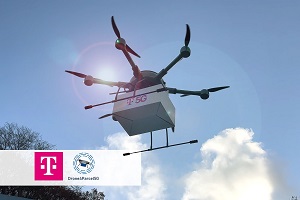5G network from Deutsche Telekom gets autonomous delivery drones in air

Deutsche Telekom is providing a 5G campus network for the “Drone4Parcel5G” research project in the South Westphalia region. The project aims to test the operations of autonomous delivery flights with 5G-connected parcel drones. The technology is intended to reduce road traffic and minimise delivery times in the future. To this end, Deutsche Telekom has equipped a test site in Rüthen (Soest district, North Rhine-Westphalia) with a mobile 5G mobile communications container that will cover the area with the latest mobile communications standard throughout the duration of the project.
This will enable researchers to test delivery drone flights in combination with 5G technology under real conditions. The drones can reliably transmit sensor, image and flight data via the 5G campus network. This short-term local 5G network is the first instance of Deutsche Telekom implementing the new business customer product ” Campus Network Temporary” for a customer.
“The Drone4Parcel5G project demonstrates the enormous innovation potential of 5G for the future of logistics. In order to enable automated flying drones to carry out parcel deliveries under the highest security standards in the future, we are already today delivering full 5G performance with our network,” says Hagen Rickmann, managing director for business customers at Telekom Deutschland GmbH. “With our new temporary 5G Campus network offering for business customers, we provide a time-flexible solution that is ideally suited for the drone flight trials.”
5G provides basis for autonomous drone delivery service
Today, drones must still be controlled by a pilot on a line-of-sight basis. In the future, an autonomous drone delivery service via 5G could allow several drones to be coordinated and monitored simultaneously in real time via a central control station, beyond the line of sight. Here, 5G drones will autonomously bring goods from A to B, via optimised routes, reacting to obstacles in order to avoid collisions. A fleet of drones operated in this way massively increases the range and efficiency of drone flights. At the same time, autonomous drone operation imposes particularly high requirements in terms of security and stability of data transmission. The project in South Westphalia is therefore investigating both communication via 5G between drone and base station and from drone to drone.
“With high data transmission rates, low latency and higher network capacity, 5G as key technology provides the basis for a safe use of autonomous transport drones”, says Andreas Schwung from the University of Applied Sciences South Westphalia and head of the consortium “Drone4Parcel5G”. “We are therefore delighted to have Deutsche Telekom, the leading 5G network provider and expert in campus networks, on board for our project.”
Drone4Parcel5G: Research for the future of logistics
The “Drone4Parcel5G” project, led by the South Westphalia University of Applied Sciences together with other partners from the region, will run until the end of 2023. The project will see the development of a system for planning and movement control of parcel drones. The state of North Rhine-Westphalia had provided funding of €1.6 million as part of the “5G.NRW” program. In the project, delivery by drone is to be tested for use-cases by pharmacies and in the industrial sector for the so-called C-parts management – for example, for the delivery of tools and metal goods in technical wholesaling or the delivery of medicines to rural regions. To this end, the drone manufacturer Third Element Aviation GmbH and KL-Group, Koerschulte + Werkverein, a wholesaler specialising in industrial and trade customers, are also part of the project.
